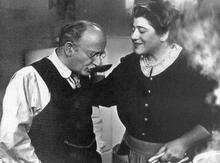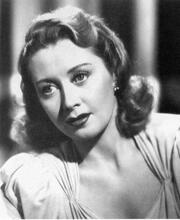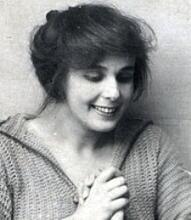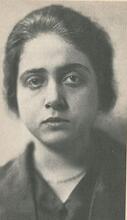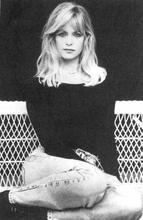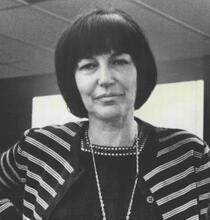Sara Sugarman
Sara Sugarman is a Welsh-born movie director and actor, who made her mark as a small-screen performer before stepping behind the camera to direct award-winning movies that are largely set in Wales. In 1999, she was one of three winners of the first Orange Prize for Screenwriting for her script, Pavarotti in Dad’s Room. Some of her best-known features include Very Annie Mary (2001), which won the Best International Screenplay Award at the Sundance Independent Film Festival in 2001, Disney’s Confessions of a Teenage Drama Queen (2004,) and Vinyl (2013). She is also known for her award-winning shorts that include Anthrakitis (1998), which was nominated for a BAFTA for Best Short Film, Up the Valley (1995), and Valley Girls (1996).
“I’m a Welsh Jewish filmmaker … I’m the best and the only one” (Rosen, 2004).
Sara Sugarman is a Welsh-born movie director and actor who made her mark as a small-screen performer before stepping behind the camera to direct multiple award-winning international movies and television productions. Sugarman was born on October 13, 1962, to a Jewish family in the North Wales seaside town of Rhyl. Her father, Paul, owned a successful clothing store. Sugarman moved to London at the age of fourteen to train as an actor. As a teenager, she attended the Arts Educational School and the Barbara Speake Stage School. At the age of 24, she enrolled at the highly competitive Royal Academy of Dramatic Art (RADA), where she graduated in 1989 with a Diploma in Acting.
Early Career
As a young actor, Sugarman appeared in several British television programs and made-for-television movies, including the BBC’s children’s drama series Grange Hill (1978-1979), County Hall (1982), Those Glory Glory Days (1983), and The Fainthearted Feminist (1984). Her acting debut in a motion picture was as Abby National in Sid and Nancy (1986), a British biographical movie about the life of Sid Vicious of the Sex Pistols and his girlfriend, Nancy Spungen. A year later, she appeared in the comedy Straight to Hell with Courtney Love, as well as the TV movie Escape from Sobibor, before playing the role of Elana in Colin Bucksey’s movie Dealers (1989). At the close of the decade, she found herself back on the small screen with a regular role on the British TV series Streetwise (1989-1992).
Although she has continued to act—later roles included Edna Marks in Bernard Rose’s Mr. Nice (2010), where she appeared alongside David Thewlis, to whom she had been married from 1992 to 1994—Sugarman is best known for her career behind the camera (she once said that her time at RADA “put [her] off acting completely” [Greenstreet, 2001]). In 1994, when she was in her early thirties, she enrolled at Bournemouth Film School. Graduating in 1995, she went on to script and direct three award-winning shorts, Up the Valley (1995), Valley Girls (1996), and Anthrakitis (1998). With such successes came the opportunity to make her first motion picture, Mad Cows (1999). There were high hopes, but the movie proved a major disappointment with critics.
Sugarman’s next movie, Very Annie Mary (2001), won the Sundance Film Maker’s Award for Best International Script and brought her to the attention of Hollywood to direct the Disney movie Confessions of a Teenage Drama Queen (2004). Despite receiving mixed reviews, the cinematic adaptation of Dyan Sheldon’s novel was a box office hit, making over $9 million in its first week. After a break of almost ten years, Sugarman returned to the big screen in 2013 with her movie Vinyl and went on to produce and direct several shorts and TV productions, including Hallelujah (2013), House of Versace (2013), and Down the Caravan (2018). In 2021, Sugarman began directing Save the Cinema, a feature that explores the true story of Liz Evans of Carmarthen, who started a campaign in 1993 to save the town’s cinema.
Welsh Themes and Settings
Sugarman once remarked that “if [she had] an ambition, it would be making films in America and Pontycymer [Wales].” A common element that ties most of her movies together are their Welsh themes and settings. Valley Girls, for instance, is about two Welsh cleaning ladies who win a trip to Hollywood. Her musical comedy Very Annie Mary, featuring several Welsh actors such as Jonathan Pryce and Joanna Page, is a coming-of-age tale about a young Welsh woman in her 30s who lives with her strict chapel-going father. Vinyl is set and filmed in Sugarman’s hometown of Rhyl and is based on the true story of Mike Peters, frontman of the ‘80s Welsh rock band The Alarm, who hoodwinked the music industry by releasing a comeback record under a fictitious teenage band's name.
Sugarman has attributed the former South Wales mining village of Pontycymer, the hometown of her good friend journalist Molly Parkin and the filming location of Very Annie Mary, for shaping her career as a filmmaker. Despite mostly dividing her time between Los Angeles and London, she is proud of her Welsh roots and carries her Welshness on her sleeve: “It’s always good for me to write and shoot in Wales. It’s my home. The land I love and the people.” (Price, 2014). Indeed, Sugarman once admitted that “If I can up my profile in America … I've more chance to come home to make my films in South Wales” (Hill,2004). In the early 2000s, there were plans for a movie set in the South Wales Valleys called Coal Board, while a decade later Sugarman partnered with Sony Pictures to make The Promised Land, a movie that set out to tell the fictional story of the descendants of a Welsh pirate living in Pontycymer who discover they are the heirs to 77 acres of land in Lower Manhattan. Both projects failed to get off the ground, however.
Sugarman’s movies often depict small-town life and she is known to include local people in her productions. While her upbringing in the faded seaside town of Rhyl has had a significant impact on this aspect of her work, the cultural environment of the small Eastern European shtetls of her ancestors may also have been influential. “What I do is kind of Eastern European without me knowing it,” she once admitted (Romney, 1999).
Jewish Influences
Despite her involvement with the Jewish Tales from Wales Film Festival in New York in 2012, Sugarman has yet to explore her own small-town Jewish roots or Jewish themes explicitly in her movies. In an interview with the London-based Jewish Chronicle in 2013, she revealed that as she gets older, the artist in her “wants to be truer to [her] own soul” and that she would have plenty of memories to draw upon if she ever decided to do her own nostalgic film memoir.
Sugarman and her family were one of a few Jewish families living in the town of Rhyl. Her parents were not religious, but they were active in communal affairs that centered around a small synagogue in a tiny room above a local bank. The lack of Term used for ritually untainted food according to the laws of Kashrut (Jewish dietary laws).kosher food in town meant relying on deliveries from Manchester (approximately 70 miles away), as well as the unconventional kashering skills of Sugarman’s grandfather: “[My family] all decided that if they said prayers over the food, God would forgive them and it would stay kosher” (Applebaum, 2013).
Sugarman’s father owned a clothing store called Mr. Paul Clothes for the Modern Man, which was so popular that she considered herself the daughter of a local celebrity. This instilled a feeling of confidence in a young Jewish child who also felt slightly out of place in a largely non-Jewish milieu. At the age of nine, Sugarman recalled a kid at school asking her if she was a monkey (“because I looked so different”) and being confused when someone asked her about “Jewish Land.” “I couldn’t work it out,” she said. “But I didn’t feel persecuted — I just felt special and different” (Applebaum, 2013).
Self-identifying as a “punk rocker” since the age of thirteen and sporting a short, spiky, anime-like hairdo for most of her life, Sugarman is a far cry away from conventional depictions of Jewish women. It was punk’s rejection of both mainstream culture and the status quo that appealed to the young Sugarman, who was also taken by the eccentric and gender-bending fashion. “I went into my brother’s bedroom, got his old school blazer, ripped it, put pins in it, got sugar and water — because we didn’t have hair gel in those days — and I never stopped dressing like that” (Owens, 2013). Punk also gave the budding actor a chance to express herself creatively, and the growing number of British punk female bands and musicians in the 1970s inspired her to form her own punk band called The Fractures.
A self-defined secular Jew, Sugarman is fascinated by the sheer diversity of Jewish life and has found ways to express this intrigue through artistic means. In 2016, she exhibited a series of cartoon-like portraits of Hasidic Jews from London’s Stamford Hill in the Soho cake shop Maison Bertaux. When interviewed about her artwork, she described herself as being “in awe of the fullness of faith of Hassidim,” a Jewish way of life so different to her own (“Exhibiting her scribbles…”, 2016). “I’m a chaotic person and not good at rituals, they [Hasidic Jews] live their life by rituals. It couldn’t be more opposite to me, yet we share this culture” (West End Extra, 2016).
Allon, Yoram, Del Cullen, and Hannah Patterson, eds. Contemporary British and Irish Film Directors. London: Wallflower, 2001.
Applebaum, Stephen. “The return of Sara Sugarman.” Jewish Chronicle, March 14, 2017.
"Exhibiting her Scribbles..." Hooligan Art Dealer, 2016. http://www.hooliganartdealer.com/hooliganartdealer/Sara_Sugarman.html.
Greenstreet, Rosanna. “My first home: Sara Sugarman.” Telegraph, November 3, 2001.
Hill, Claire. “Welsh director's movie wows US.” Wales Online, March 3, 2004, https://www.walesonline.co.uk/news/wales-news/welsh-directors-movie-wows-us-2443531.
Murphy, Robert. Directors in British and Irish Cinema: A Reference Companion. London: British Film Institute, 2019.
Owens, David. “Mike Peters and Sara Sugarman tell the story behind rock ‘n’ roll hoax movie Vinyl.” Wales Online, March 9, 2013, https://www.walesonline.co.uk/lifestyle/showbiz/mike-peters-sara-sugarman-tell-2493888.
Price, Karen. “Sara Sugarman directs all-Welsh Under Milk Wood performance in LA.” Wales Online, September 17, 2014, https://www.walesonline.co.uk/whats-on/arts-culture-news/sara-sugarman-directs-all-star-under-7788684.
Price, Stephanie. “Rhyl's Sara Sugarman to direct movie based on true story of Welsh pirate.” Rhyl, Prestatyn & Abergele Journal, December 5, 2014.
Romney, Jonathan. “Triumph of the Rhyl.” Guardian, October 22, 1999.
Rosen, Lisa. “Turning Hollywood into her playground.” Los Angeles Times, February 19, 2004. West End Extra. “Venue is My Cup of Tea Says Artist.” May 13, 2016.
YouTube. “Director Sara Sugarman Interview - Vinyl UK Premiere.” Accessed February 20, 2021. https://www.youtube.com/watch?v=8SSYFkn-zLc.

